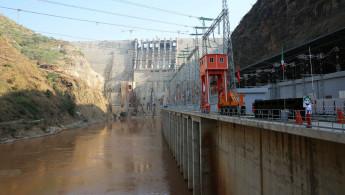Turkey, Iran summoned over bombing of Kurdish rebels in Iraq as offensive expands in region
Baghdad on Thursday summoned ambassadors from Turkey and Iran over their countries’ separate military operations this week targeting Kurdish rebels in northern Iraq, calling the attacks an affront to Iraq’s sovereignty.
In an airborne-and-land operation dubbed “Operation Claw-Tiger,” Turkey airlifted troops into northern Iraq on Wednesday to root out the outlawed Kurdistan Workers Party, or PKK, which it says maintains bases across the border in Iraq.
Turkey regularly carries out air and ground attacks against the PKK in northern Iraq, and has defended these operations saying that neither the Iraqi government nor the regional Iraqi Kurdish administration have taken measures to remove PKK insurgents.
The operation by commando forces is being supported by warplanes, attack helicopters, artillery and armed and unarmed drones into the border area of Haftanin, some 15 kilometers (9 miles) from the Turkey-Iraq border.
The ground operation was launched following intense artillery fire into the area on Tuesday. Turkish Ambassador Fatih Yildiz was first handed a summons to the Foreign Ministry on Tuesday and again on Thursday, as the operation continued overnight.
According to an Iraqi ministry statement, the Turkish ambassador was given a “strongly worded protest note calling for the cessation of such provocative acts."
“We stress the necessity of the Turkish side's commitment to stop the bombing and the withdrawal of its forces from Iraqi territories that it penetrated yesterday,” the statement said.
The ministry also called for the removal of Turkish forces from the Bashiqa mountain in Nineveh province, where Turkey has maintained a presence since 2015.
|
In a tweet, Yildiz said the summons was “a new occasion to emphasize that we will continue to fight the PKK wherever it is, unless Iraq takes steps to end the PKK presence in the country.”
Turkey began expanding its military footprint in Iraq last summer in an intense operation against PKK targets following the July 17 assassination in Irbil of Osman Kose, who worked for the Turkish Consulate there. Ankara has blamed the PKK for his killing.
Iraq on Thursday also summoned Iranian Ambassador Iraj Masjedi to protest the bombardment of border villages in the Haji Omran area outside of Irbil the previous day. The shelling resulted in property damages to the villages, the statement said.
Iran routinely attacks its own Kurdish rebels who have bases in northern Iraq. In a statement, the Iraqi ministry condemned the attack and called on Iran to respect Iraq’s sovereignty and encouraged bilateral cooperation to maintain security along the shared border
Turkish expanded its artillery offensive in northern Iraq on Wednesday.
The intense firing into the area preceded a cross-border ground operation against Kurdish rebels as Turkey on Wednesday announced it has airlifted troops into northern Iraq.
The airborne-and-land offensive reached into the border region of Haftanin, some 15 kilometers (9 miles) from the Turkey-Iraq border, according to the Defense Ministry in Ankara.
Read more: Disaster looms for Egypt's political prisoners as coronavirus fears mount
The operation by commando forces is being supported by warplanes, attack helicopters, artillery and armed and unarmed drones, according to the ministry's statement posted on Twitter.
It did not say how many troops are involved.
Turkey regularly carries out air and ground attacks against the outlawed Kurdistan Workers Party, or PKK, which it says maintains bases in northern Iraq.
It has defended its past operations into northern Iraq, saying neither the Iraqi government nor the regional Iraqi Kurdish administration have acted to remove PKK insurgents who allegedly use Iraq's territory to stage attacks on Turkey.
According to one local mayor in the Haftanin area of Dohuk province said Turkish forces entered the villages of Keshani, Shilan, Menira, Belbla, Mezuri, Awlayi and Reesha. Bombings began Tuesday night and continued throughout the day Wednesday, he said.
Residents of the villages refused to leave their farmlands because it is their only source of livelihood, he said.





 Follow the Middle East's top stories in English at The New Arab on Google News
Follow the Middle East's top stories in English at The New Arab on Google News
![Both Hamas and the Palestinian Authority welcomed the ICC arrest warrants [Getty]](/sites/default/files/styles/image_330x185/public/2024-11/GettyImages-2178351173.jpg?h=199d8c1f&itok=TV858iVg)

